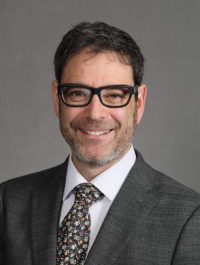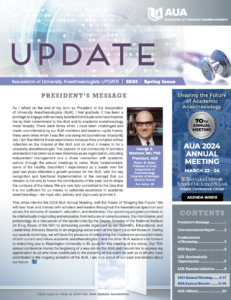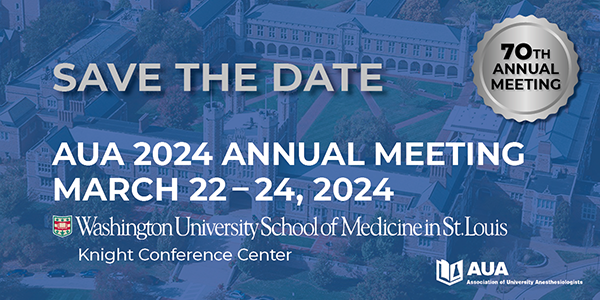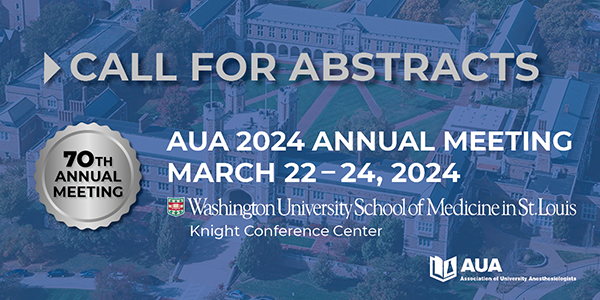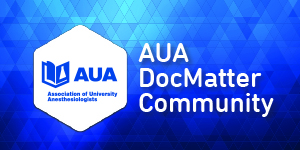President’s Message
“What counts in life is not the mere fact that we have lived; it is what difference we have made to the lives of others that will determine the significance of the life we lead." — Nelson R. Mandela
It has been my privilege to serve as the President of the Association of University Anesthesiologists (AUA) over the last two years. Events of the past six months have rocked the AUA, as they have the whole world. First the COVID-19 pandemic swept across the globe, wreaking devastation on health, healthcare, academic activities, and social structure. In its wake, it also brought massive unemployment and economic devastation. Notably, those most heavily impacted by COVID-19 have been from under-represented minority groups and from lower economic strata of society. The COVID-19 pandemic has exposed the systemic inequities in healthcare around the world, including in the United States. Going forward, disparities in health and health outcomes should be an important focus for us in the AUA. In recent weeks we have also had shocking reminders of the systematic and violent racism that is endemic in our society. This has been exemplified by the horrific murders of Ahmaud Arbery, Breonna Taylor, and George Floyd. Prejudice is woven into the historic fabric of our society, and it provides rationalization for violence against people based on their race, sex, ethnicity, sexual orientation, and gender. As such, prejudice is a major public health concern, and should be a priority issue for the AUA. As a practical step, we in the AUA could consider supporting the efforts of organizations such as White Coats for Black Lives: https://whitecoats4blacklives.org/.
The AUA was formed with the recognition that an organization was needed to provide a home to academic anesthesiologists and to advance the interests of academic anesthesiology. The AUA is also an honorific organization, which could be regarded by some as an anachronism, sometimes serving to maintain elitism, and standing in the way of building diversity and inclusion. An alternative perspective is that maintaining merit-based membership is what gives the AUA its unique character and prestige — and helps to maintain its high academic standards. Regardless of one’s perspectives on this debate, the reality is that in 2020, the AUA remains an organization of predominantly older white men. Its composition does not reflect that of the broader anesthesiology or academic communities. With its unrepresentative composition, the AUA could at times be out of step with and even potentially tone deaf to the concerns of our broader society. Reflecting on this as my term as AUA President ends, I believe that addressing our unrepresentative character is an important opportunity for us in the AUA going forward.
The AUA has certainly had several important accomplishments over the last few years. In general, we have often engaged in activities intended to safeguard anesthesiology as a dynamic academic medical specialty, with a vibrant community of successful scientific, educational and medical leaders. The AUA has embraced leadership development within our field. As part of this focus, the AUA is prioritizing the mentorship of rising academics in anesthesiology, and is supporting initiatives such as the early stage anesthesiology scholars (eSAS). One of the most important innovations for the AUA has been the establishment of the Leadership Advisory Board, which will now plan activities of the AUA in collaboration with our Scientific and Educational Advisory Boards. It is also exciting to note that, in a secret electronic ballot with a high level of participation, the membership of the AUA has almost unanimously embraced new Vision and Mission statements, which are more relevant to the challenges we confront in 2020 and align better with the goals of early stage academic anesthesiologists.
The (new) Vision of the Association of University Anesthesiologists (AUA) is the advancement of academic anesthesiology as a dynamic specialty that makes substantive contributions to medicine, science, and society.
The (new) Mission of the AUA is to promote excellence in academic anesthesiology through:
- Mentorship of academics in anesthesiology;
- Promotion of diversity and inclusion in academic anesthesiology;
- Facilitation of professional growth throughout the careers of educators, academic leaders, and researchers in anesthesiology;
- Organization of an outstanding annual meeting and provision of networking opportunities to academics in anesthesiology.
It has been my pleasure to serve the AUA as a Councilor-at-Large, as Secretary, as President Elect, and most recently as President. I look forward to continuing to serve on the Council for the next two years as Past President. Jeff Kirsch will be a dedicated and collaborative President; he brings fresh energy and exciting new ideas to the AUA. Jeff is supported by a committed, accomplished and experienced group of Councilors. We now also have strong representation at a leadership level from our three Advisory Boards as well as from the Early Stage Anesthesiology Scholars. Much has already been done to ensure that the AUA is more accountable to its members, and that it is forward looking and innovative in its approach. However, we shall have to do so much more as we strive toward our goal to build an equitable and inclusive Association that better represents the diversity of our broader society. We must ensure that we work tirelessly to achieve diversity, equity, and inclusion both within the AUA and within the specialty of anesthesiology.
Let’s internalize the lessons of 2020 and ensure that the decade to come for the AUA is characterized by progressive action and disruptive innovation, rather than just honorific membership and business as usual.
